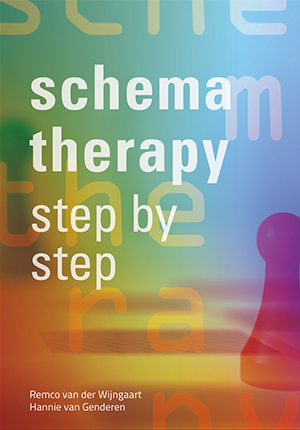Start phase
- Getting started: exploring patterns and schemas
- Discussing the scores on the YSQ
- Diagnostic Imagery
- Introducing modes
- Discussing the mode model
- Discussing goals of therapy
- Mode guessing game
Treatment Phase
- Limited Reparenting - Offering care
- Limited Reparenting - Providing direction
- Limited Reparenting - Empathic Confrontation
- Limited Reparenting - Limit setting
- Detached Protector - Chairwork
- Historical role play
- Bully & Attack-Empathic Confrontation
- Punitive Parent - Imagery rescripting
- Bullying Peers - Imagery rescripting
- Punitive Parent - Chairwork
- Punitive Parent - cognitive technique
- Vulnerable Child - Circle Diary Form
- Vulnerable Child: audio flashcard
- Vulnerable Child - Set homework
- Angry Child: Ventilate, Empathize, Reality testing
- Angry Child - Chairwork
- Structure of complete session with transitions to black
End phase
- Empathic Confrontation
- Detached Protector - Chairwork: coaching Healthy Adult
- Detached Protector - Chairwork: therapist plays coping mode
- Punitive Parent - Chairwork
- Punitive Parent - Imagery Rescripting
- Healthy Adult - Identifying the Healthy Adult
- Healthy Adult - psychoeducation
- Future Imagery - mode awareness & mode management
- Future Imagery - behavioral change
- Homework assignments
- Healthy Adult - dealing with conflict
Examples of schemas
- Mistrust/Abuse
- Emotional Deprivation
- Abandonment
- Social Isolation
- Defectiveness/Shame
- Social Rejection
- Failure
- Dependence/Incompetence
- Vulnerability to Illness & Harm
- Insufficient Self-control/Self-Discipline
- Entitlement/Grandiosity
- Unrelenting Standards
- Emotional Inhibition
- Self-sacrifice
- Subjugation
- Enmeshment
- Punitiveness
Examples of modes
- Vulnerable Child
- Angry Child
- Enraged Child
- Impulsive Child
- Undisciplined Child
- Happy Child
- Compliant Surrender
- Detached Protector
- Detached Self-soother
- Avoidant Protector
- Angry Protector
- Self-aggrandizer
- Bully & Attack 1
- Bully & Attack 2
- Predator
- Perfectionistic Over - controller
- Paranoid Over - controller
- Conning and Manipulative Mode
- Approval Seeking
- Punitive Parent
- Demanding Parent
- Guilt-inducing Parent
- Healthy Adult
Exercises
- Exploring patterns & schemas exercise
- Identifying different schemas - exercise 1
- Identifying different schemas - exercise 2
- Identifying different modes - exercise 1
- Identifying different modes - exercise 2
- Discussing the scores on the YSQ: exercise
- Diagnostic Imagery exercise
- Offering care at start of therapy - exercise
- Providing direction at the start of therapy - exercise
- Empathic Confrontation - exercise 1
- Empathic Confrontation - exercise 2
- Limit setting exercise 1
- Limit setting exercise 2
- Schema interactions - exercise
- Mode interactions - exercise
- Chairwork: fighting the punitive antagonist - exercise 1
- Chairwork: fighting the punitive antagonist - exercise 2
- Dealing with anger-exercise 1
- Dealing with anger-exercise 2
- Dealing with anger-exercise 3
